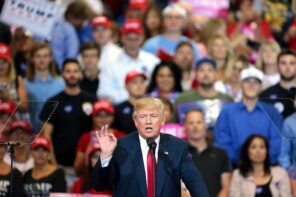An Indiana man is due in state appellate court today to argue that Indiana’s Religious Freedom Restoration Act (RFRA) allows him to claim a religious exemption from paying taxes, according to the Indianapolis Star. It’s a relatively small case involving an individual’s alleged tax evasion to the tune of barely $1,000, which has already been dismissed by a lower court. But if Rodney Tyms-Bey’s appeal is successful, the strategy seems tailor-made to serve the incoming administration of president-elect Donald Trump and vice president-elect Mike Pence.
Keep in mind that before he became Trump’s running mate, Pence was best known nationally for his dogged defense of the state’s economically disastrous RFRA, which allowed businesses and individuals to refuse service to LGBT people based on their “sincerely held religious beliefs.” And while Pence ultimately amended that law under substantial pressure, he left intact a key provision that distinguishes Indiana’s RFRA from the federal version enacted in 1993. Under the law Pence signed, Hoosiers can use their sincerely held religious belief as a defense against criminal allegations—including tax evasion. It’s a tactic that, if history is any indication, Trump and those running his “blind trust” of businesses will be eager to exploit.
Tyms-Bey claims that Indiana’s RFRA absolves him of his responsibility to pay $1,042.82 in back taxes on his income, alleging that the financial penalty is an unreasonable burden on his free exercise of religion. Tyms-Bey did not identify his particular faith practice in his filing, but his attorney pointed to other Indiana residents who have used RFRA as a defense against criminal allegations, notes the Star.
And although Indiana’s RFRA hadn’t yet been enacted when Tyms-Bey allegedly evaded his taxes, if his claim is successful, it could provide a crucial road map for how beefed-up religious freedom laws can be used as a shield against tax liability. That’s relevant for the incoming Trump-Pence administration, as both have expressed support for the proposed First Amendment Defense Act, a sweeping federal bill that would prohibit the government from taking any “adverse action” against an organization, individual, or corporation that acts in accordance with its sincerely held religious beliefs regarding marriage. The language on that bill has not yet been finalized, but the fact that a similar law is being used as a criminal defense in the legal landscape Pence oversaw before joining the campaign is a foreboding sign for the scope of the federal legislation.
While the American public knows very little about the financial status of its president-elect, the existing evidence suggests Trump is a master at avoiding paying what he owes. As The New York Times reported in early October, a leaked page from Trump’s 1995 tax returns indicated that the billionaire reported a $916 billion net loss that year, which, experts estimate, means he could have essentially avoided paying taxes for 18 years.
Trump managed to pull off that financial sleight of hand without any kind of religious exemption. So it’s only reasonable to expect that, with Pence whispering sweet “religious liberty” nothings into the president-elect’s ear, Trump will continue to take advantage of every legal loophole he can to avoid paying taxes. That just makes him smart, as Trump reminded people on the campaign trail. And with Pence taking the lead on domestic policy (at least on the transition team), and serving as Senate President, it’s not far-fetched to suspect that this politician’s pet issue of religious freedom will be wielded as a sword in Trump’s America (to the Trump family’s benefit, of course). Certainly, any hope of a kinder, less discriminatory FADA has evaporated with the red tide that swept Washington on November 8.





